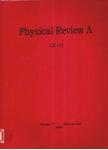版权所有:内蒙古大学图书馆 技术提供:维普资讯• 智图
内蒙古自治区呼和浩特市赛罕区大学西街235号 邮编: 010021

作者机构:Laboratory for Information and Decision Systems Massachusetts Institute of Technology Cambridge Massachusetts 02139 USA Lincoln Laboratory Massachusetts Institute of Technology Lexington Massachusetts 02420 Department of Mathematics Massachusetts Institute of Technology Cambridge Massachusetts 02139 USA
出 版 物:《Physical Review A》 (物理学评论A辑:原子、分子和光学物理学)
年 卷 期:2007年第75卷第1期
页 面:012338-012338页
核心收录:
学科分类:070207[理学-光学] 07[理学] 08[工学] 0803[工学-光学工程] 0702[理学-物理学]
主 题:CORRECTING CODES ENTANGLEMENT CAPACITIES CHANNELS
摘 要:Quantum error correction (QEC) is an essential element of physical quantum information processing systems. Most QEC efforts focus on extending classical error correction schemes to the quantum regime. The input to a noisy system is embedded in a coded subspace, and error recovery is performed via an operation designed to perfectly correct for a set of errors, presumably a large subset of the physical noise process. In this paper, we examine the choice of recovery operation. Rather than seeking perfect correction on a subset of errors, we seek a recovery operation to maximize the entanglement fidelity for a given input state and noise model. In this way, the recovery operation is optimal for the given encoding and noise process. This optimization is shown to be calculable via a semidefinite program, a well-established form of convex optimization with efficient algorithms for its solution. The error recovery operation may also be interpreted as a combining operation following a quantum spreading channel, thus providing a quantum analogy to the classical diversity combining operation.